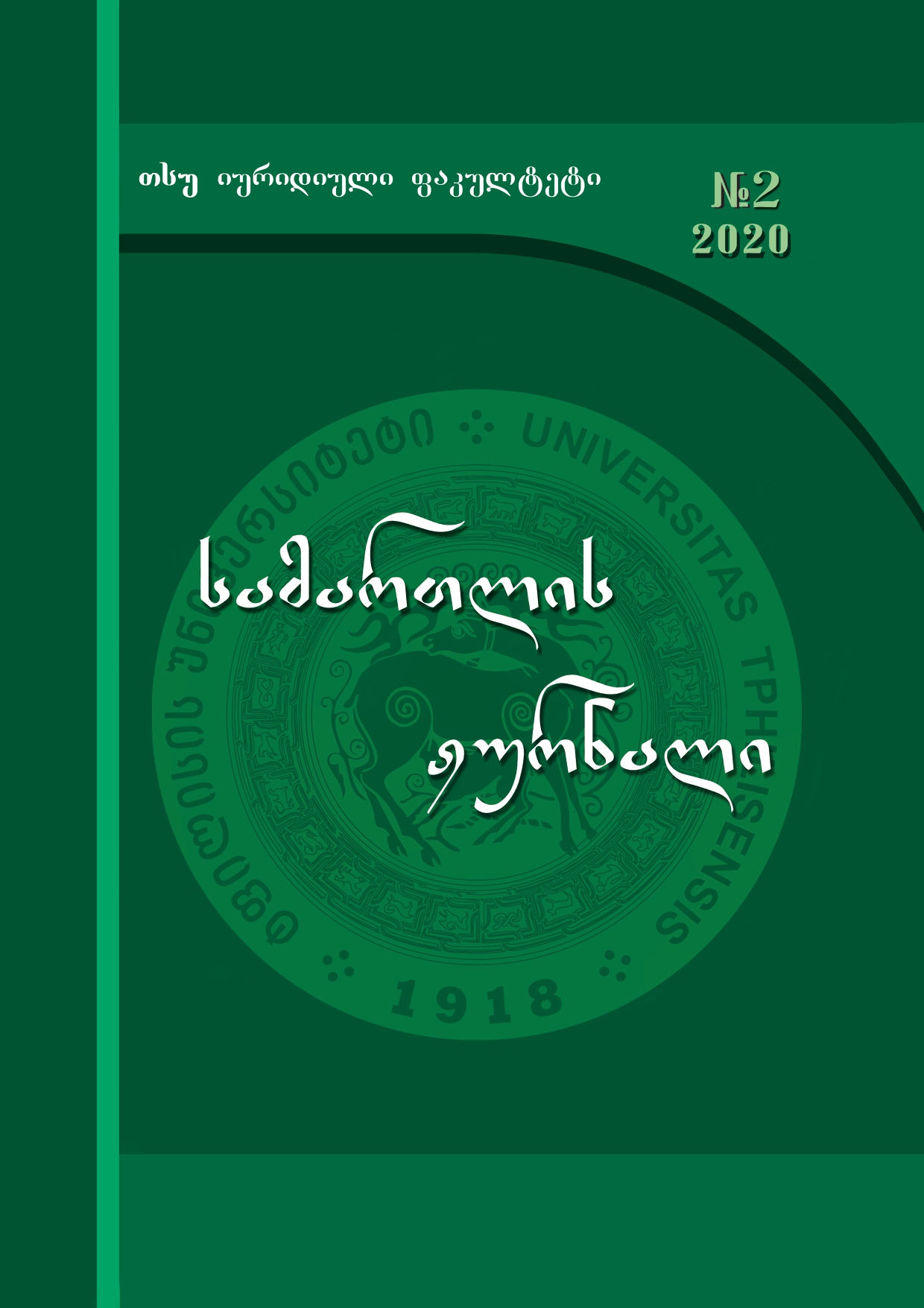მშენებლობის სანებართვო ადმინისტრაციული წარმოება, როგორც მშენებლობის უსაფრთხოების განხორციელების მექანიზმი
DOI:
https://doi.org/10.48614/jlaw.2.2020.180-201საკვანძო სიტყვები:
მშენებლობა, საფრთხე, მშენებლობის ნებართვა, ადმინისტრაციული წარმოება, მშენებლობის უსაფრთოება.ანოტაცია
სტატია ეხება სამშენებლო სამართლის უმნიშვნელოვანეს ინსტიტუტს, მშენებლობის ნებართვას და მისი გამოცემის ადმინისტრაციული წარმოებისას მშენებლობის უსაფრთხოების გათვალისწინების პრობლემატურ საკითხებს. სტატიაში მშენებლობის ნებართვის ადმინისტრაციული წარმოება არის განხილული მშენებლობის უსაფრთხოების მიღწევის მთავარ საშუალებად და ბერკეტად. ხაზგასმულია, რომ სანებართვო ადმინისტრაციული წარმოება თავისი ფუნქციებიდან და მექანიზმებიდან გამომდინარე საუკეთესო ეტაპია უსაფრთხო მშენებლობის მისაღწევად. ამ მიზნით სტატიაში განხილულია ისეთი მნიშვნელოვანი საკითხები როგორიცაა: ადმინისტრაციული წარმოების ფუნქციები, მშენებლობის ნებართვის ადმინისტრაციული წარმოების ეტაპზე დაინტერესებულ პირთა მონაწილეობის პრობლემები და თავისებურებანი. ასევე, განხილულია საკითხი, რომელიც უკავშრდება გადაუჭრელ პრობლემას სამშენებლო დოკუმენტაციის წარმდგენ პირთა და მის განხილავზე უფლებამოსილი ორგანოების თანამშრომელთა კვალიფიკაციას. ამ მიმართულებით მოყვანილია უცხო ქვეყნების საუკეთესო მაგალითები და დასახულია პრობლემათა გადაჭრის გზები. ამასთან, სტატიაში მშენებლობის უსაფრთხოების მიღწევისთვის დასახულია მეზობელთა ინტერესების დაცვის, მათი ადმინისტრაციულ წარმოებაში ჩართულობის მნიშვნელობა. ამის შემდგომ მშენებლობის ნებართვის გაცემის პროცესში ერთ-ერთ უმთავრეს საფრთხედ წარმოჩენილია დაჩქარებული საქმისწარმეობის პრობლემატიკა და წარდგენილი დოკუმენტაციის შესწავლის ფორმალურობის საკითხი. ბოლოს კი საფრთხის წარმოქმნის მექანიზმად განხილულია საგამონაკლისო და გამარტივებული ნებართვები, მათი გამოცემის ე. წ. „მახინჯი“ პრაქტიკა საქართელოში.
სტატიაში გამოყენებულია შედარებითსამართლებრივი და ანალიზის მეთოდი, დასახული პრობლემის გადაჭრითვის შემოთავაზებულია კონკრეტული რეკომენდაციები და კანონმდებლობის დახვეწის გზები.
იმედია, წინამდებარე სტატია თავის მოკრძალებულ წვლილს შეიტანს მშენებლობისგან მომდინარე საფრთხეების აღმოფხვრაში და ზოგადად სამშენებლო სამართლის მეცნიერებაში.
წყაროები
Organic Law General Administrative Code of Georgia, LHG 32(39),1, 15/07/1999.
Local self-Government Code of Georgia, 19/02/2014.
The Code of environmental Evaluation of Georgia, 01/06/2017.
Law of Georgia “Code of Georgian Space Planning, Architectural and Construction Activities”, LHG, 3213, 20/07/2018.
Resolution of the Government of Georgia № 255 on “the Rules and Conditions of Issuing Construction Permit and Approving Validity of Building”, 31/05/2019.
Resolution № 261 of the Government of Georgia on “The Fundamental Provisions of Using Territories and Regulating Urban Construction” 03/06/2019.
Resolution № 17.01.580 of the Government of the City of Tbilisi on “Approving the Rules of Accelerated Services provided by the Architecture Service of the City of Tbilisi and Paying the Service Price” 30/06/2009.
Altman R. J., Participants in the design and construction process, in: Construction Law, Allensworth W., Altman R. J., Overcash A., Patterson C. J. (Ed.), Forum on Construction Law, American Bar Association, 2009, 20-21.
Brenner M., Öffentliches Baurecht. 3, Aufll, Heidelberg., 2009, 192, 198, 203, 204, 208, 209.
Brohm W., Öffentliches Baurecht, §30 Rn. 9, § 31 Rn. 3, Rieger W., in: Schrödter H., BauGB, § 31 Rn. 45.
Churgulia D., The Ways of Solving the Legislative and Practical Problems of Construction Permit in the Light of New Construction Code, “Law Journal”, № 1, 2019, 294-296.
Held J., Der Grundrechtsbezug des Verwaltungsverfahrens, Berlin, 1984, 37.
Hermes G.,The German Law and Planning: An Overview, Journal European Public Law, Birkinshaw P. J. (Ed.), Vol. 8, Issue 3, 2002, 379.
Hoppe W., Bönker C., Grotefls S., Öffentliches Baurecht, 4. Auflage, Munchen, 2010, 456-457.
Kalichava K., Environmental Law, Tbilisi, 2018, 186, 197 (in Georgian).
Khalichava K., Controle of Permissibility of Costruction Activities in Georgia (Necessity of Reform and Perspecytives), “Administrative Law Journal”, №2, 2016, 96, 97, 101 (in Georgian).
Kalichava K., The Impact of Construction Law Reform on Freedom of Business, Forum Materials of The Institute of Administrative Sciences of Tbilisi State University, Book 2, Tbilisi, 2016, 38-39 (In Georgian).
Kopp F.O., Ramsauer U., Verwaltungsverfahrensgestz Kommentar, 16. Aufl., Munchen, 2015, 21, 22.
Maurer H, Allgemeines Verwaltungsrecht, Munchen, 2011, § 19, Rn. 1 f.
Muckel S., Ogorek M., Öffentliches Baurecht, 2. Aufl., Munchen, 2014, 223.
Quabeck C., Dienende Funktion des Verwaltungsverfahrens und Prozeduralisierung, Osnabrück, 2010, 26.
Siegel T., Rechtschutz vor Gericht und im Verwatlungsverfahren–wechselseitige Kompensationsmöglichkeiten?, Zeitschrift für Umweltrecht, 2, 2017, 451.
Hess S. A., Melton L. C., The Design Undertaking, Construction Law, Forum on Construction Law, American Bar Association, Allensworth W., Altman R. J., Overcash A., Patterson C. J. (Eds.), Chicago, Illinois, 2009, 131, 135.
Stollmann F., Öffentliches Baurecht § 20 Rn. 19, Schrödter, BauGB, § 31 Rn. 45, 317, 318
Turava P., Pirtskhalaishvili A, Kardava E., Administrative Porceedings in Public Service, Tbilisi, 2020, 35, 36, 139, 144, 145 (in Georgian).
Turava P., Kalichava K., Construction Law, Tbilisi, 2020, 76, 150, 151, 160, 163, 165, 172, 177, 182 (in Georgian).
Turava P., Fair Administrative Proceeding as a Basic Constitutional Right and its Institutional Guarantee, Compilation of Articles, Human rights Protection: Legislation and Practice, Korkelia K. (Ed.), Tbilisi, 2018, 250 (in Georgian).
Turava P., Comments to the Law on Public Service of Georgia, group of authors, Kardava E. (Ed.), Tbilisi, 2018, 125 (in Georgian)
Turava P., Tskepladze N., Handbook of General Administrative Code, Tbilisi, 2013, 178-179 (in Georgian).
Turava P., The Basic Concpts and Institutes of Construction Law, “Law Journal“, № 2, 2009, 122.
Turava p., Kharshiladze I., Administrative Proceedings, Tbilisi, 2006, 10-11.
Decision of November 1, 2016 №BS-289-287 (2k-16), The Supreme Court of Georgia.
Decision of April 20, 2017 №BS-930-922 (2k-16), The Supreme Court of Georgia.
Homogenous practice of the Supreme Court of Georgia regarding disputes arising out of construction relations (2012-2017), Jorbenadze S. (Ed.), Tbilisi, 2018, 17-19 (in Georgian).
https://bm.ge/ka/article/41-e-dadgenileba---reglamenti-romelic-msheneblobis-nebartvis-migebas-aferxebs/48160 [03.02.2020].
https://bm.ge/ka/video/ratom-aferxebs-41-e-dadgenileba-msheneblobis-nebartebs/16826 [06.02.2020].
https://www.geostat.ge/ka/modules/categories/80/mshenebloba [07.02.2021].
http://tas.ge/?p=publicpage&documentId=742273 [22.05.2020].
ჩამოტვირთვები
გამოქვეყნებული
როგორ უნდა ციტირება
გამოცემა
სექცია
ლიცენზია

ეს ნამუშევარი ლიცენზირებულია Creative Commons Attribution-ShareAlike 4.0 საერთაშორისო ლიცენზიით .









